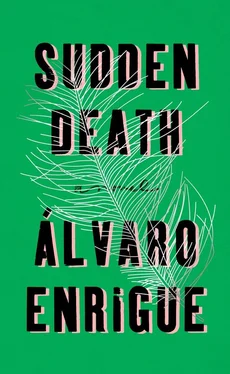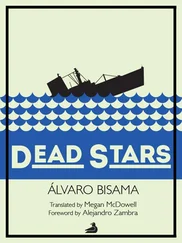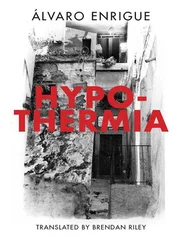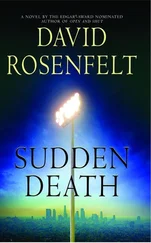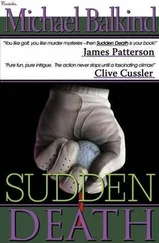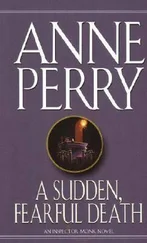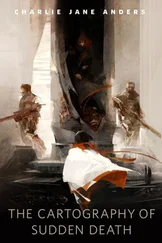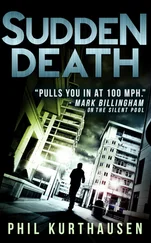The poet did one more squat, and when he rose, the duke was holding his sword belt over the railing. The moment the poet reached for his sword, Saint Matthew lunged for the artist’s blade. The poet withdrew his hand and spat in disgust, stirring the spittle with the toe of his boot. He stared at the Italians as if they were creatures from another world, and then he returned to the line of service without giving them a second glance. All right then, said the duke, setting down the belt. With a half smile and a nod, the Lombard acknowledged that his opponent had recovered his dignity, and he moved to the rear of the court. The mathematician — who all this time had been counting the beams in the roof of the gallery — had fallen asleep. Tenez!
The first couple of points were played with force and fury (15–15). The artist was finally focused, and the poet had forgotten the encumbrance of his hangover and was intent solely on winning. The third point began with an extraordinarily vicious serve from the Spaniard, and the slice with which it was returned brought a moment of light to the court. Against the odds and perhaps the laws of gravity, the poet reached the ball as it bounced just inside the cord. His stroke was sound, but not forceful enough to win the point. He ran back, imagining that the artist would aim for the dedans; his guess was right. Then he covered the corners as if it were no work at all, his opponent peppering him with bullets, each harder, straighter, and deadlier than the last. At the end of the point the artist did something to the ball that killed it just as it cleared the cord. The linesmen exchanged glances: this might be a decent game after all. There was applause from Saint Matthew and the hangers-on, the two seconds, and the four or five people who had come to sit in the stands. Quindici — trenta, cried the mathematician; primo vantaggio per il milanese .
The poet noticed that the people still standing — maybe other tennis players who would size one another up and take their measure against the poet’s challenger when the professional gamblers began to arrive — were now finding seats in the gallery. The rapt interest with which the recent arrivals watched the movement of the ball gave him a tiny taste of glory, which, beleaguered as he was, he felt he definitely deserved.
It had been a difficult morning. He’d woken early with a parched throat and a headache hard and hot as a flatiron, and he hadn’t been able to go back to sleep, confused, guilt-ridden, and mortified as he was.
What in Christ’s name happened last night, he’d asked when the duke finally came down for breakfast at the Tavern of the Bear, where they were staying. The poet had been punishing himself for a while, sitting without a bite to eat on the plank floor of the courtyard, waiting for someone to come down and accompany him to Piazza Navona.
The duke’s face was puffy and marked with pillow creases, but he was impeccably dressed in black: belt, cloak, and hat hung from his arm. Upon being asked what had happened, the grandee shrugged and called for a beer and some bread spread with lard. Tiepida o calda, asked the innkeeper’s wife. Hot lard, warm beer — and put an egg in it. After his first swallow he opened his eyes a little more. His friend was still full of gloom. Nothing happened, he said, but we have to go and defend your honor, and mine too — the usual. The poet was conscious of his generosity in not even touching on the events of the night before. And Spain’s, Duke, and Spain’s. The other man smiled: Spain’s indeed, when she’s proved herself worthy. He finished the bread, gulped down the beer, and, rising, put on his gloves; he fastened his sword belt around his waist and wrapped himself in his cloak. Let’s go, he said, we can’t be late.
Since it was nearly midday, the back gate to the courtyard was open and only the double doors separated them from the street. The duke put on his hat, opened one door, and looked to see who was passing before he set foot on the cobblestones — the hilt of his sword at hand, his fingers hovering nervously over it. He stepped out. Once on the pavement, he checked the street corners again and said: Clean and clear. But as he waited for the poet — who scarcely had the presence of mind to strap on his own belt — he kept his hand on his sword.
Tenez! Despite the complications of a serve set to rolling on the roof, the Lombard lifted the ball high enough to clear the cord, though with no sting. A survival stroke, one that left him off balance. The Spaniard hammered it back. Thirty — thirty. The next two points were long and exciting: many onlookers gathered. Deuce, cried the mathematician when they tied at forty.
A close, hard-fought game would be to the poet’s advantage. To wear down the artist, he had to keep the score even. A tortuous and symmetrical match for an inclement day on which everything came in pairs. That morning the poet and the duke had walked to the piazza like Siamese-twin bailiffs. The two of them in cloaks and hats, shoulder to shoulder, right arms crossed over their chests. Spanish self-defense: fists visibly gripping hilts of swords. The people out to run a last errand before lunch had given them a wide berth. The inn wasn’t far at all from the courts, and they made the walk without incident.
When the circus of Piazza Navona appeared before their nervous eyes, Saint Matthew and a few other louts were already in conversation by one of the L-shaped wooden galleries that bounded the courts the city had built so that the plebs could fortify their bodies and temper their souls — if they happened to have souls — by playing the fashionable game of the day. They moved toward the court, still on guard and with no sense at all of ridiculousness. Once arrived, they separated. The duke glanced at the Obelisk of Domitian, which in those days still functioned as a sundial. It’s almost noon, he said.
The Italians, perfectly at ease, removed their hats when they saw them take their places in the gallery. Though the Spaniards were wearing swords — the pope had forbidden the citizens of Rome to bear arms — they were all cordial to one another, even warm, as strangers can be when they’ve spent a night drinking together. There were embraces, the duke’s the most vigorous of all — the better to count daggers under capes.
The poet’s opponent and his second appeared on the far side of the piazza a little later. The mathematician was dressed formally, like the poet and the duke, but in the blue robes and cap of a professor. He carried a leather case containing the implements of the duel. The artist, victim of a perhaps overly personal fashion sense, had on long, close-fitting black breeches of stiff, heavy cotton instead of hose. They fell to the heels of his boots. He was wearing a collarless shirt, also black, cinched by a leather vest of the same color. His cloak, cut in the Spanish style, was black and very worn. On his head was a narrow-brimmed hat, adorned with neither feather nor brooch. He carried a sword: his employment in the service of a bishop meant that this was permitted, even though he was a local.
For a moment it seemed as if the Spaniard would rally and take the set. He went on the attack, covering the court like a man with a longer reach. When he didn’t volley the return, he got to the ball after its bounce off the wall. The third time they came to a tie, the duke was happy to see that on the other side of the court a recent arrival had put his bet of four bits down on the service side. He noticed this when Matthew and his cronies, who until now had resisted the urge to bet, took up a collection of coins to put on the artist’s side.
Custom dictated that the visitor choose a racket — one of two — and the ball with which they were to play — one of three — so the duke had been surprised that there was only one ball in the artist’s kit. He took it. There was no substantial difference between the rackets, so he chose the one that seemed most used, thinking that it was probably the Lombard’s favorite and that depriving him of it would put them ahead.
Читать дальше
